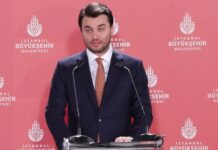The COVID-19 pandemic continues to hit Turkey’s overcrowded prisons hard, with news of new infections coming from Hilvan Prison in the southeastern city of Şanlıurfa.
In a tweet human rights defender and pro-Kurdish Peoples’ Democratic Party (HDP) deputy Ömer Faruk Gergerlioğlu said former military officer Müjdat Pala was currently unconscious at Şanlıurfa’s M. Akif İnan Hospital and that all the prisoners in his ward had tested positive for coronavirus.
According to Mehmet Aydın, a former inmate who was recently released from Hilvan prison and who spoke to the TR7/24 news website, more than 50 inmates had contracted COVID-19. Aydın also said that despite the pandemic, the prison administration continues to ration the water used by inmates.
Urfa!!!@adalet_bakanlik
"Sayın vekilim, Hilvan 1 Nolu T tipi cezaevi B-8 Koğuşunda eski Üsteğmen Müjdat PALA Şuan Ş. URFA M. Akif İNAN Hastanesinde bilinci kapalı bir şekilde yatmaktadır. Tüm koğuş pozitif. "
— Ömer Faruk Gergerlioğlu (@gergerliogluof) December 1, 2020
The Turkish parliament passed an early parole law on April 14 aimed at reducing the inmate population of the country’s overcrowded prisons due to the coronavirus pandemic. The legislation, which excludes political prisoners such as politicians, journalists, lawyers, academics and human rights defenders convicted under the country’s controversial counterterrorism laws, prompted calls from the UN and the EU for the non-discriminatory reduction of prison populations.
Pala was dismissed from the Turkish Armed Forces (TSK) in 2016 after an abortive putsch on July 15, 2016. Following the failed coup, which, according to many, was a false flag aimed at entrenching the authoritarian rule of President Recep Tayyip Erdoğan by rooting out dissidents and eliminating powerful actors such as the military in his desire for absolute power, the Turkish government declared a state of emergency and carried out a massive purge of state institutions under the pretext of an anti-coup fight. Over 130,000 public servants, including 4,156 judges and prosecutors, as well as 20,571 members of the armed forces were summarily removed from their jobs for alleged membership in or relationships with “terrorist organizations” by emergency decree-laws subject to neither judicial nor parliamentary scrutiny.















